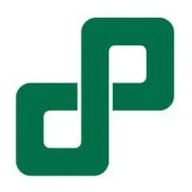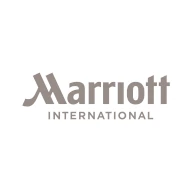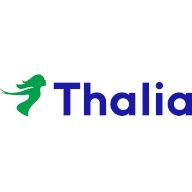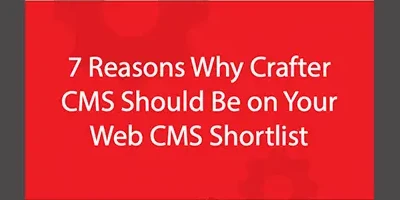Creating Personalized Journeys: How a Headless CMS Enhances Travel & Hospitality Experiences

Sara Williams

The average traveling customer can enter an airport and receive updates about everything related to their trip directly on their phone: from flight status notifications to hotel messages, about the specials their restaurant offers for first-time guests, or ways to make reservations for the city tour later in the week.
Their journey with these businesses didn’t begin when they got in the taxi to the airport either. Instead, it may have started eight months prior when they received an email from their travel marketplace with a summer vacation discount for families of four.
The travel and hospitality industry includes a number of companies, not just hotels, airlines, and cruise liners but also car rental agencies, travel insurance companies, and more. Regardless of which part of the industry these businesses belong to, the goals generally remain the same: delivering a personalized and engaging customer experience. Having the right content platform is essential to providing such an experience. In this article, we’ll explain how a headless CMS can improve travel and hospitality digital experiences.
Understanding Hospitality
The hospitality industry is an expansive sector that includes travel services, air travel, hotels & lodging, cruise lines, gaming and parks & recreation. Within this multifaceted industry, each business has its own unique challenges to overcome.
However, at its core, hospitality is about creating memorable experiences for guests and travelers. As such, the industry thrives on providing exceptional customer service, personalized experiences, and seamless interactions across various touchpoints, both digital and in-person.
As of 2023, the global hospitality market reached over $4.7 trillion and was forecasted to reach $11.6 trillion by 2029. This growth is influenced by technological advancements and changing travel behaviors, and businesses in the sector must adapt accordingly.
Modern customers aren’t just looking for a place to stay or eat but an immersive experience that is unique and tailored to their individual preferences. Encouraged by social media platforms, including Instagram and TikTok, travelers value convenience, quick access to information, and personalized services that enhance their overall journey.
Hospitality businesses must, therefore, provide elements like user-friendly booking processes, customized travel recommendations, real-time updates, and responsive customer service to positively impact customer perceptions and experiences.
Content is a vital component in meeting these expectations. In a digital-first world, where travelers extensively research and plan their trips online, the quality, relevance, and accessibility of content can significantly impact a hospitality brand’s success.
Factors Affecting Hospitality
When selecting tools to power content experiences, hospitality companies should consider several factors that impact how they do business and the customer experience. A few key factors include:
- Legal challenges: Alterations in laws and regulations, such as labor laws, safety regulations, and health codes, can impact operations.
- Economic factors: Economic fluctuations, currency exchange rates, inflation, and recession affect consumer spending on travel and leisure.
- Social trends: Changing consumer preferences, lifestyle shifts, and cultural changes impact guest expectations and demands.
- Technology advancement: Innovations affect service delivery, guest experiences, and operational efficiencies within the industry.
- Environmental factors: Climate, weather conditions, and sustainability practices influence tourism patterns and operational choices
- Political unrest: Changes in government policies, geopolitical issues, and civil unrest can impact tourist perceptions and travel decisions.
Unique Hospitality Processes
When deciding on core technologies, hospitality businesses must consider the unique industry processes as tools may need to perform multiple functions. In the case of a CMS, it will need to integrate with custom or industry-specific technologies to provide the best experience for hospitality users. Some of those unique processes include:
- Reservation and booking processes: Managing and accessing guest reservations and bookings
- Check-in and check-out: Ensuring seamless guest arrival and departure
- Dynamic distribution management: Managing rates and distribution channels for revenue optimization
- Queue management: Effectively managing wait times to prevent loss of revenue and maintain optimal guest experience
- Housekeeping procedures: Ensuring cleanliness and maintenance of guest rooms and amenities
- Guest services and experiences: Providing personalized guest services to enhance their experience
Defining CMS Requirements
A headless CMS can empower hospitality businesses to efficiently manage and distribute content across multiple channels and meet customer expectations. It can also help them adjust to the industry’s unique challenges. However, businesses must first understand their unique requirements before identifying what they need from technology.
Customer Requirements
Services Areas
Hospitality businesses should define their core service areas so that they can properly segment customers and identify the solutions that help them serve their needs. For example, do they need a modern website that includes booking processes and other features embedded, or will it simply be an intranet portal for employees to find information?
Frequency of Visits
Companies in the hospitality industry also need to determine the frequency of visits their customers will be making to their website, mobile app, or other owned channels.
Channel Preferences
Understanding the preferred communication and consumption channels of customers, whether the main website, social media, email, or mobile apps allows companies to tailor their content distribution strategies to effectively reach and engage their audience where they are most active.
Customer Locales
Hospitality businesses need to understand the geographic distribution of their customer base to localize content for different regional markets.
Personalization
Hospitality businesses should also prioritize understanding their customers’ preferences and behaviors when receiving personalized experiences.
Digital Experience Products
In the travel and hospitality industry, various digital experiences play pivotal roles in enhancing customer engagement and operational efficiency:
Marketing Websites
These are essential for attracting potential travelers by showcasing destinations, accommodations, and services. They provide detailed information, high-quality visuals, customer reviews, and booking options, often integrated with SEO and digital marketing strategies to drive traffic and conversions.
Travel Agent Portals
These platforms streamline interactions between travel agents and suppliers, offering tools for booking, itinerary management, and customer support. They centralize information on travel packages, availability, pricing, and special offers, enhancing the efficiency and accuracy of travel planning and sales processes.
E-Commerce Experiences
E-commerce platforms in the travel and hospitality sector facilitate online booking and purchasing of travel-related products and services. They provide secure payment gateways, personalized recommendations, dynamic pricing, and upselling opportunities for additional services like tours, activities, and insurance.
Kiosks
Self-service kiosks are used in hotels, airports, and tourist attractions to improve customer convenience and reduce wait times. They enable guests to check-in/check-out, print boarding passes, access information, and make payments for services, enhancing the overall customer experience.
Mobile Apps
Mobile applications offer travelers on-the-go access to information, bookings, and services. They provide features like mobile check-in, digital room keys, itinerary management, real-time updates, and location-based recommendations, ensuring a seamless and personalized travel experience.
In-Room OTT Video Entertainment
Over-the-top (OTT) video services in hotel rooms offer guests access to a wide range of entertainment options, including movies, TV shows, and streaming services. These systems enhance the in-room experience, providing personalized content and integration with guests' own streaming accounts for a home-like entertainment setup.
Product Owner Requirements
For each of the digital experience products (the marketing website, the travel agent portal, the e-commerce experience, etc.), the product owner has several requirements to define, deliver, and refine over time.
Product Requirements
Hospitality businesses need to define the types of products and services offered to customers as part of the digital experience. These can range from websites and apps to extranets, travel agent vs. customer portals, and the like. They will then need to define the teams in charge of each product and ensure the CMS provides the right capabilities.
Team Requirements
Teams working in hospitality businesses must be equipped with the necessary tools and skills to create and manage content effectively for their desired use case, whether that means updating content on the website or launching new pages for a partner campaign with another type of company in the sector.
Measuring Success
Hospitality organizations need to establish clear metrics and KPIs to measure the success of their marketing strategies. This allows them to make data-driven decisions and continuously improve the effectiveness of their initiatives.
Training
Comprehensive training on new tools and processes is critical for staff to utilize resources more efficiently.
IT Requirements
Architecture
IT teams managing hospitality infrastructure need to ensure that the system architecture is flexible and scalable to support the evolving needs of the business.
Security
Businesses in the hospitality sector manage a vast amount of data, and IT requirements should include implementing strong security measures to protect against data breaches and other cyber threats.
Operational Requirements
IT teams at hospitality companies should be able to provide high system availability and reliability to support continuous business operations. This involves regular maintenance, updates, and monitoring to prevent downtime and disruptions.
Integration Requirements and Dependencies
Seamless integration of various systems, both modern tools and legacy systems, is a requirement for businesses in the hospitality sector to create a cohesive and efficient operational environment.
Headless CMS Selection Guide
When trying to select the right content platform, particularly a headless CMS, travel and other hospitality businesses should choose a platform by focusing on usability, manageability, and support requirements.
Easy to Use
- Design: Evaluate whether the platform supports multiple devices, ensuring users can access it from their preferred devices.
- Navigation: Ensure the Information Architecture supports user needs, making it intuitive and easy to navigate.
- Search: Check that the search functionality is accessible, straightforward, and delivers relevant and fast results.
- Content: Determine if the content is easy to consume for all users’ needs, including all types of media assets.
- Features: Verify that the features out-of-the-box (OOTB) can be deployed without requiring extensive tooltips or training.
- Integration: Assess if integrations enhance the customer experience by improving relevancy, content enrichment, and search capabilities.
- Security: Confirm that the platform reduces authentication roadblocks without compromising security.
- Roadmap: Ensure the roadmap benefits both customers and the administration of the platform, aligning with long-term goals.
Easy to Change & Manage
- Design: Ensure platform owners have controls to manipulate the design as needed.
- Navigation: Check if the Information Architecture can adapt to changes quickly.
- Search: Ensure metadata management and relevancy can be handled without IT intervention.
- Content: Confirm that creating and managing content can be done through self-service.
- Features: Determine if platform owners can add or subtract features as needed and if custom development is necessary.
- Integration: Verify that the platform supports relevant integrations.
- Security: Ensure the platform meets SecOps requirements without adding day-to-day complications.
- Roadmap: Assess whether the roadmap supports both customers and platform administration effectively.
Easy to Support
- Design: Identify the skills required to update designs, including themes and templates.
- Navigation: Determine if changes require technical support.
- Search: Assess the skills needed to change search results and improve functionality.
- Content: Verify that technical intervention is not required to manage content.
- Features: Compare out-of-the-box (OOTB), configurable, and custom features.
- Integration: Evaluate the level of effort needed to add integrations.
- Security: Ensure seamless integration with the SecOps Playbook.
- Roadmap: Assess the effort required to upgrade versions and keep the platform current.
Why CrafterCMS Is Ideal For Building Hospitality Experiences
CrafterCMS is an enterprise-grade headless CMS that offers the ideal architecture and functionality for delivering on the promise of personalized digital experiences for businesses in the travel and hospitality industry.
Multi-channel CMS
CrafterCMS is designed to support multi-channel digital experiences by enabling seamless content creation, management, and delivery across various digital platforms. It offers a decoupled architecture that allows content to be published and consumed via APIs, facilitating content delivery via to multiple digital channels such as the web, mobile, social, signage, email, text message, and more.
CrafterCMS provides robust tools for creating personalized and dynamic content tailored to specific audiences and channels. Its flexible content modeling and reusable content components ensure consistent and efficient content delivery. And its real-time preview capabilitiy allows content authors to see exactly what the user experience will be on each digital channel.
Multi-tenant CMS
CrafterCMS supports multi-tenancy, allowing multiple independent websites or digital experiences to be hosted on a single instance of the CMS. This capability is crucial for organizations managing numerous brands, regions, or departments under one platform. In the travel and hospitality industries, this includes marketing websites, travel agent portals, e-commerce experiences, kiosks, mobile apps, in-room OTT video entertainment, and much more.
CrafterCMS enables each tenant to have its own isolated environment, including separate content repositories, user roles, and permissions, ensuring security and data integrity. The platform's architecture allows for easy scalability and customization for each tenant without affecting others. Additionally, administrators can efficiently manage and monitor all tenants from a centralized dashboard, streamlining content governance and operational efficiency across the enterprise.
Composable Architecture
CrafterCMS integrates with other best-of-stack tools as a composable CMS, enabling travel and hospitality companies to build and maintain a composable Digital Experience Platform (DXP) that evolves to meet current and future requirements. This flexibility ensures that organizations can continuously adapt to changing market demands and technological advancements while delivering exceptional customer experiences.
Decoupled Architecture
CrafterCMS features a truly decoupled architecture, with the API-first content authoring platform and authoring app (Crafter Studio) completely separate from the API-first headless content delivery engine (Crafter Engine). In contrast, other headless platforms claim to be “decoupled,” but this typically means only that the end-user interface is separate from the content repository. CrafterCMS’s approach offers significantly greater security, reliability, performance, and scalability benefits.
Design & Development Flexibility
CrafterCMS’s headless functionality allows the use of any frontend framework, from React to Freemarker, as well as backend frameworks like Groovy, JavaScript, and Node.js. This flexibility has enabled enterprises to boost development and QA productivity by over 40%.
Robust Content Authoring Capabilities
CrafterCMS offers intuitive content authoring tools for creating, updating, and publishing content across any channel. With features like drag-and-drop experience building, WYSIWYG content editing, and multi-channel preview, teams can design digital experiences for various use cases. This approach eliminates 95% of the typical content editing and publishing bottlenecks and headaches associated with other headless CMS platforms.
Localization & Personalization Capabilities
Localization and personalization are essential for hospitality businesses as they cater to global audiences. CrafterCMS provides built-in localization and personalization capabilities, including multilingual content management, content tagging, personas, and integrations with translation management tools.
Integrations & Marketplace
CrafterCMS offers an API-first architecture, which makes integrating with leading third-party tools easier and removes the need for developers to build integrations from scratch every time. Additionally, the CrafterCMS Marketplace offers a variety of pre-built plugins, allowing businesses to rapidly develop new features and create custom plugins that can be reused across multiple websites and apps.
Scalability
CrafterCMS provides elastic scalability, allowing hospitality businesses to manage increasing traffic demands without sacrificing performance. This ensures smooth user experiences even during peak periods.
DevContentOps
CrafterCMS offers unique support for DevContentOps processes, which brings content management processes and the CMS tool into the DevOps equation. This approach allows for seamless code movement from development to production environments and content from production back to development using simple push and pull operations. DevContentOps enables content and software development teams to collaborate effectively, facilitating the publication of new content updates, the release of new software features, and the delivery of engaging customer experiences.
Crafter Cloud
Crafter Cloud is a private SaaS/PaaS solution that gives enterprises some control over infrastructure while delivering the simplicity of a SaaS experience. This elastically scalable headless CMS platform is fully hosted and managed by CrafterCMS, eliminating businesses needing to handle servers, networks, or other infrastructure.
Use Cases
Leading enterprises throughout the travel and hospitality industry have leveraged CrafterCMS to deliver engaging content experiences. Here are some examples:
Extranets
Marriott International wanted a centralized CMS that could work closely with its independent hotels and brands and be used to power a global extranet. Marriott uses CrafterCMS to power its extranet, allowing corporate employees and franchisee owner/operator associates to quickly and securely access all brand-related content, policies, procedures, and data.
The platform’s social collaboration features enhance the user experience, boosting productivity and loyalty. This, in turn, leads to improved customer experiences across all 30 Marriott brands worldwide.
Cloud-based Websites
Azamara Cruises needed to migrate all its content assets from its legacy Drupal CMS to an enterprise-grade headless CMS capable of delivering a personalized guest experience, increasing engagement time, and boosting direct bookings.
By adopting a cloud-based website on Crafter Cloud, Azamara met its authoring needs while enjoying flexibility in content modeling, user-friendly editing, and multi-channel publishing. This transition enabled it to deliver unique experiences to each target audience and efficiently share content between them.
Additionally, Azamara introduced personalization features, including tailored product pricing and promotions across 12 different locales, enhancing the overall guest experience and engagement.
Wrapping Up
With a platform like CrafterCMS, enterprises in the travel and hospitality sector can effectively meet all of their digital experience needs. Watch this talk from CrafterCMS Live! 2024 to learn more about CrafterCMS and see how an implementation partner supports businesses in the industry: Top Considerations When Building a Global Extranet for a Hospitality Leader.
Related Posts

AI Skills for CMS-Based Web Development

Sara Williams
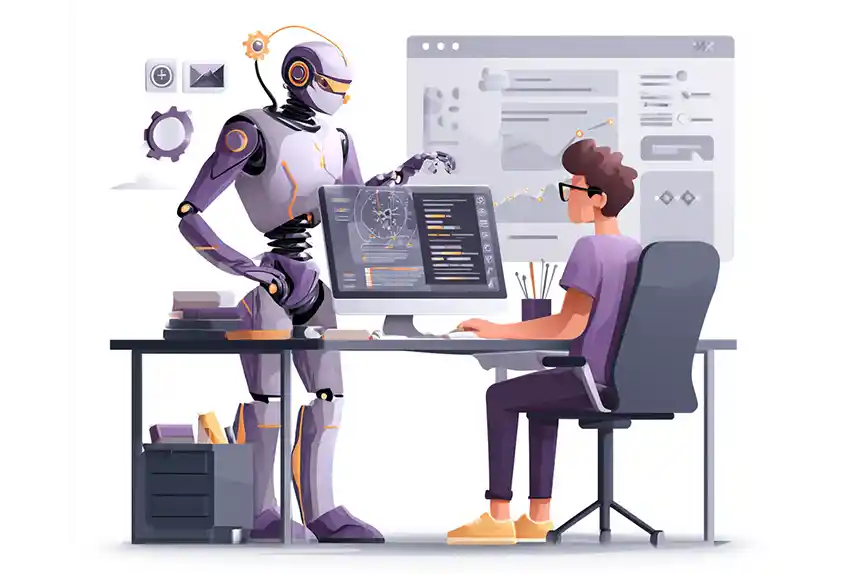
From HTML Template to Fully Managed Experience in Minutes: CrafterCMS + AI-Powered Workflows

Sara Williams

How Should You Structure a Blog Post So AI Models Actually Cite It?

Amanda Jones
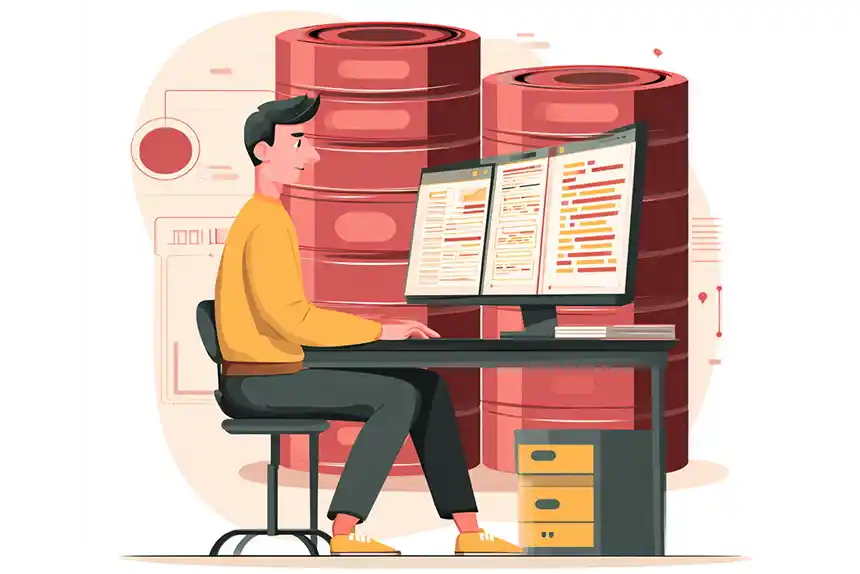
Publishing Content from Crafter Studio to External Systems and Databases

Sara Williams
Related Resources
-
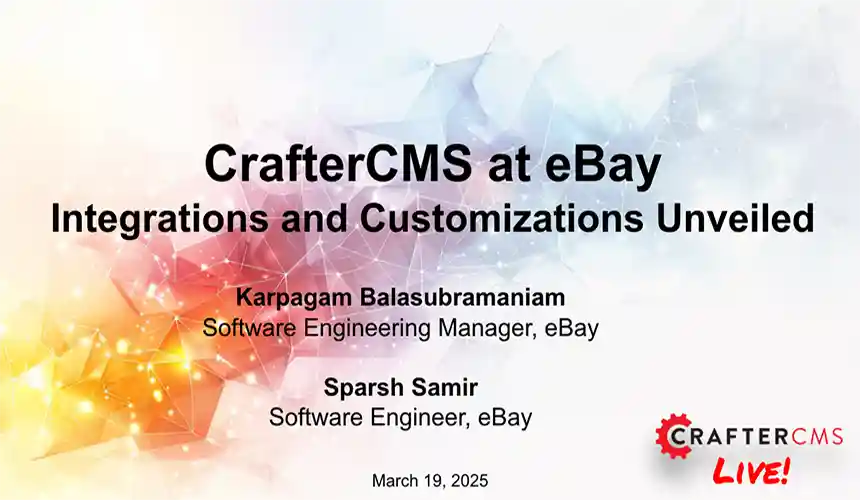
CrafterCMS at eBay: The Universal Content Platform for eBay.com
Webcast
-
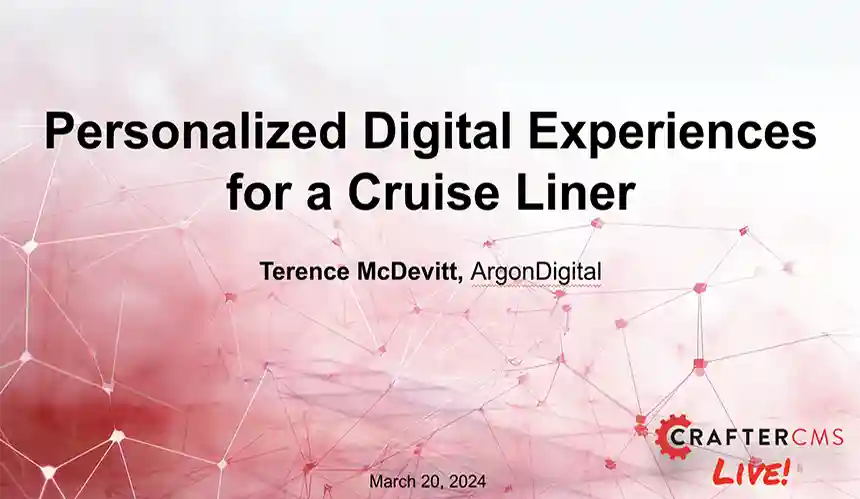
Personalized Digital Experiences for a Cruise Liner
Webcast
-
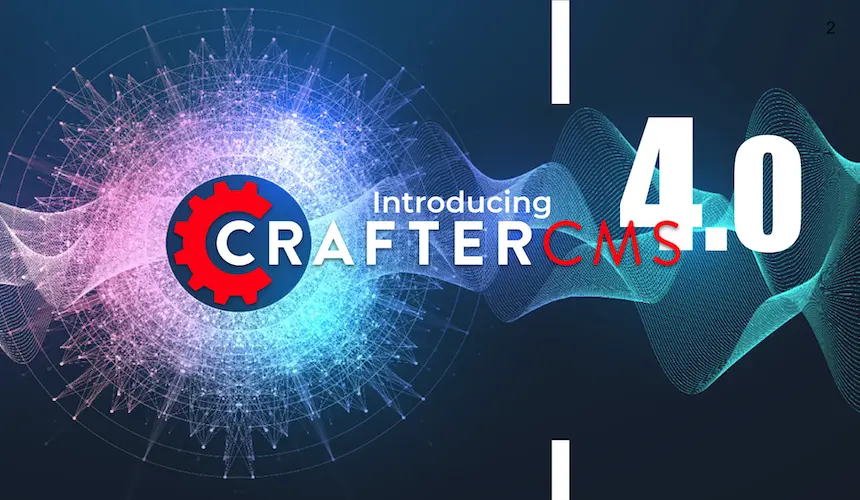
Introducing CrafterCMS v4.0
Webcast
-
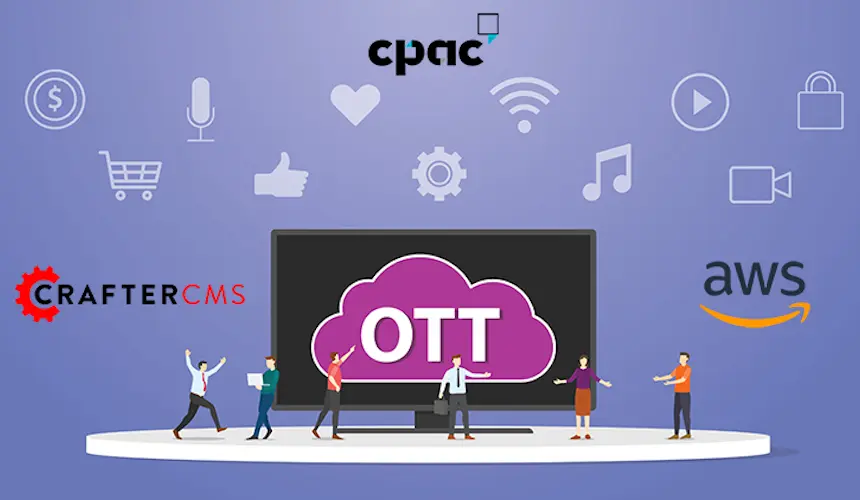
Modernizing Video Delivery and Content Management at CPAC, A Canadian Nationwide Broadcaster
Webcast
-
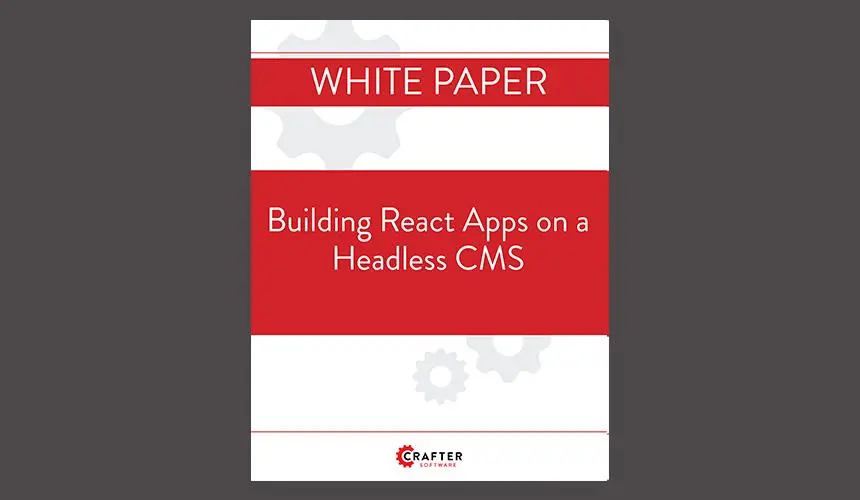
Building React Apps on a Headless CMS
White Paper
